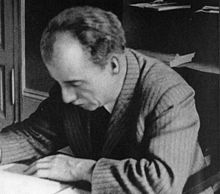migrating Persondata to Wikidata, please help, see challenges for this article |
Cyberbot II (talk | contribs) Rescuing 1 sources. #IABot |
||
| Line 28: | Line 28: | ||
===Trial and execution=== |
===Trial and execution=== |
||
Huber's political activities came to the attention of the [[Gestapo]] and he was arrested on February 27, 1943. By coincidence, composer [[Carl Orff]] called at Huber’s house the day after he was taken. Huber’s wife begged him to use his influence to help her husband. But Orff told her that if his friendship with Huber was ever discovered he would be “ruined.” Orff left, Huber’s wife never saw him again. Later, wracked by guilt, Orff would write a letter to his late friend Huber imploring him for forgiveness.<ref>http://entertainment.timesonline.co.uk/tol/arts_and_entertainment/music/article5366154.ece{{Subscription}}</ref><ref>http://www.independent.co.uk/arts-entertainment/theatre-dance/features/dark-heart-of-a-masterpiece-carmina-buranas-famous-chorus-hides-a-murky-nazi-past-1050503.html |
Huber's political activities came to the attention of the [[Gestapo]] and he was arrested on February 27, 1943. By coincidence, composer [[Carl Orff]] called at Huber’s house the day after he was taken. Huber’s wife begged him to use his influence to help her husband. But Orff told her that if his friendship with Huber was ever discovered he would be “ruined.” Orff left, Huber’s wife never saw him again. Later, wracked by guilt, Orff would write a letter to his late friend Huber imploring him for forgiveness.<ref>http://entertainment.timesonline.co.uk/tol/arts_and_entertainment/music/article5366154.ece{{Subscription}}</ref><ref>{{cite web|url=http://www.independent.co.uk/arts-entertainment/theatre-dance/features/dark-heart-of-a-masterpiece-carmina-buranas-famous-chorus-hides-a-murky-nazi-past-1050503.html |accessdate=January 13, 2009 |deadurl=yes |archiveurl=http://web.archive.org/web/20090118121551/http://www.independent.co.uk:80/arts-entertainment/theatre-dance/features/dark-heart-of-a-masterpiece-carmina-buranas-famous-chorus-hides-a-murky-nazi-past-1050503.html |archivedate=January 18, 2009 }}</ref> Orff's ''[[Die Bernauerin]]'', a project which he completed in 1946 and which he had discussed with Huber before the latter's execution, is dedicated to Huber's memory. The final scene of this work, which is about the wrongful execution of [[Agnes Bernauer]], depicts a guilt-ridden chorus begging not to be implicated in the title character's death. |
||
Huber was brought before the [[People's Court (German)|People's Court]] on April 19. In a brief [[show trial]], Chief Justice [[Roland Freisler]] subjected Huber to a humiliating verbal attack (see the exchange quoted in the [[Josef Wirmer]] article). He was sentenced to death for [[insurrection]]. |
Huber was brought before the [[People's Court (German)|People's Court]] on April 19. In a brief [[show trial]], Chief Justice [[Roland Freisler]] subjected Huber to a humiliating verbal attack (see the exchange quoted in the [[Josef Wirmer]] article). He was sentenced to death for [[insurrection]]. |
||
Revision as of 22:45, 18 March 2016
Kurt Huber | |
|---|---|
 | |
| Born | October 24, 1893 Chur, Switzerland |
| Died | July 13, 1943 (aged 49) Munich, Germany |
| Nationality | German |
| Occupation | Professor at the University of Munich |
| Known for | White Rose movement |
Kurt Huber (October 24, 1893 – July 13, 1943) was a university professor and member of the White Rose group, which carried out resistance against Nazi Germany.
Early life

Huber was born in Chur, Switzerland, to German parents. He grew up in Stuttgart and later, after his father's death, in Munich. He showed an aptitude for such subjects as music, philosophy and psychology. Huber became a professor of Psychology and Music in 1926 at the Ludwig Maximilian University of Munich.
Resistance
Huber was appalled by the rise of the Nazis. Huber decided that Hitler and his government had to be removed from power. He came into contact with the White Rose movement through some students who attended his lectures, Hans Scholl and Alexander Schmorell.
Huber wrote the White Rose's sixth and final leaflet calling for an end to National Socialism.
Trial and execution
Huber's political activities came to the attention of the Gestapo and he was arrested on February 27, 1943. By coincidence, composer Carl Orff called at Huber’s house the day after he was taken. Huber’s wife begged him to use his influence to help her husband. But Orff told her that if his friendship with Huber was ever discovered he would be “ruined.” Orff left, Huber’s wife never saw him again. Later, wracked by guilt, Orff would write a letter to his late friend Huber imploring him for forgiveness.[1][2] Orff's Die Bernauerin, a project which he completed in 1946 and which he had discussed with Huber before the latter's execution, is dedicated to Huber's memory. The final scene of this work, which is about the wrongful execution of Agnes Bernauer, depicts a guilt-ridden chorus begging not to be implicated in the title character's death.
Huber was brought before the People's Court on April 19. In a brief show trial, Chief Justice Roland Freisler subjected Huber to a humiliating verbal attack (see the exchange quoted in the Josef Wirmer article). He was sentenced to death for insurrection.
On July 13, Huber was executed by guillotine at Munich's Stadelheim Prison, along with Alexander Schmorell. The university had stripped Huber of his position and his doctorate at the time of his arrest.
Attempts to take up a collection for Huber's widow Clara only brought about more trouble and eventually led to Hans Leipelt's arrest and execution.
Legacy
The square opposite from the main building of the Ludwig Maximilians University of Munich was named "Professor Huber Platz" in his remembrance.
Huber is also known for a biography of Gottfried Leibniz which he completed while in prison.
After the war, a memorial volume with contributions from his friends and colleagues, including the 1946 letter from Carl Orff, was published by his widow.[3]
References
- ^ http://entertainment.timesonline.co.uk/tol/arts_and_entertainment/music/article5366154.ece(subscription required)
- ^ http://web.archive.org/web/20090118121551/http://www.independent.co.uk:80/arts-entertainment/theatre-dance/features/dark-heart-of-a-masterpiece-carmina-buranas-famous-chorus-hides-a-murky-nazi-past-1050503.html. Archived from the original on January 18, 2009. Retrieved January 13, 2009.
{{cite web}}: Missing or empty|title=(help); Unknown parameter|deadurl=ignored (|url-status=suggested) (help) - ^ Clara Huber (ed.), Kurt Huber zum Gedächtnis, Bildnis eines Menschen, Denkers und Forschers, dargestellt von seinen Freunden (Regensburg: Josef Habbel, 1947).